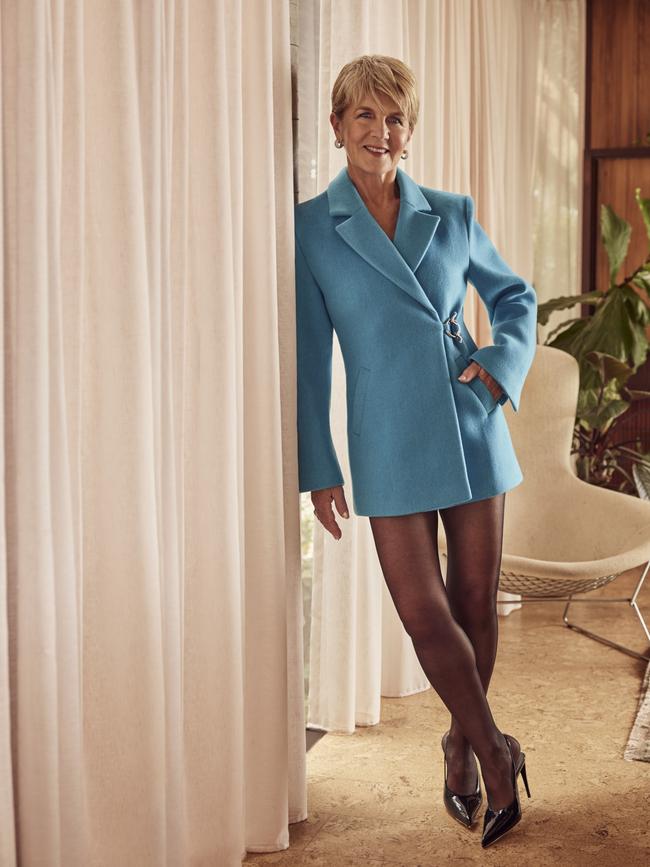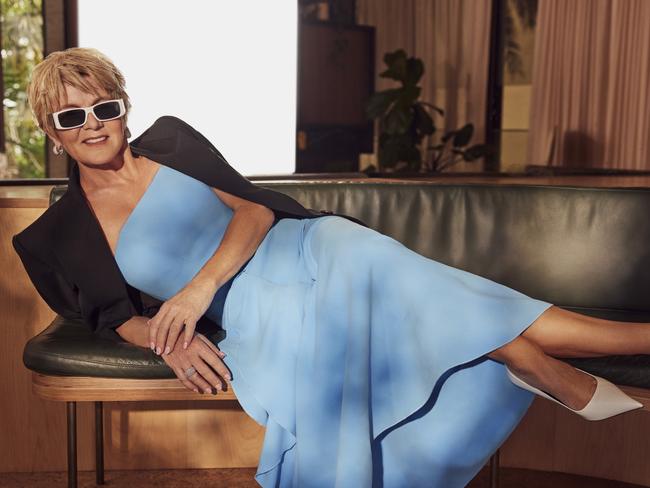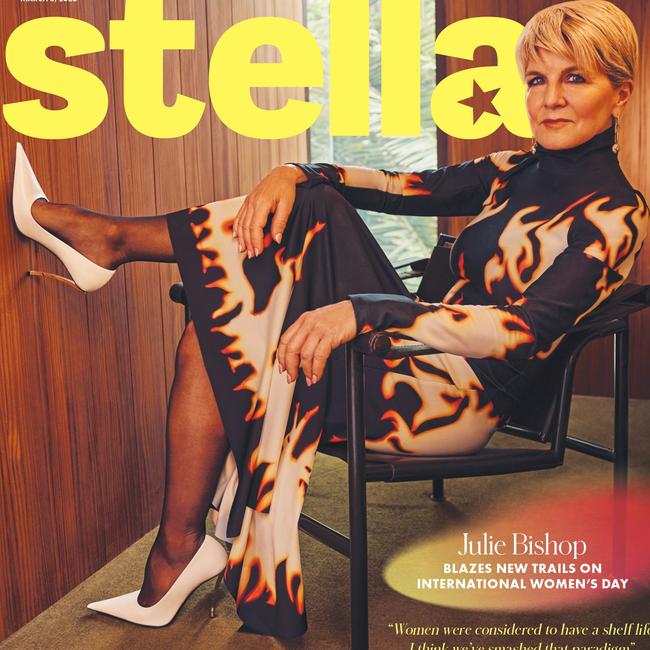‘I don’t let others define who I am or what I do’: Julie Bishop as you’ve never seen her before
Former foreign minister Julie Bishop blazed a trail in politics and now is embarking on her next career move, as she breaks her silence on her relationship status.
Stellar
Don't miss out on the headlines from Stellar. Followed categories will be added to My News.
EXCLUSIVE: As Australia’s first female foreign minister – one of many “firsts” she has achieved in her career – Julie Bishop is used to breaking down barriers.
Now, nearly four years after her departure from federal politics, the 66-year-old continues to set new benchmarks, this time as an official “friend” of luxury retail store David Jones.
Ahead of International Women’s Day on March 8 and her first appearance as a DJs ambassador at Melbourne Fashion Festival tonight, Bishop opens up to Stellar about her post-political life, reinventing herself and the power of fashion to make a statement – age notwithstanding.
Stellar: There was a moment during our cover shoot when you placed the white Versace stiletto you were wearing up against the wall. What prompted that pose?
Julie Bishop: International Women’s Day [on Wednesday] is about empowering women, and women feeling self-confident – drawing on their strengths and talents. When we were doing that pose, I just felt that I needed to look in control, empowered. That was the message I hope it sends.
S: Fittingly, this is our annual International Women’s Day-themed issue. What does the word “feminism” mean to you?
JB: I see myself as a woman who pursues her own career, her own path in life. I set my own standards, I meet my own benchmarks and I don’t let others define who I am or what I do.

S: You held a number of positions in the Coalition governments in which you served, including Deputy Leader of the Liberal Party and Minister Assisting the Prime Minister for Women’s Issues. What do you think when you reflect on your time in politics?
JB: I was the first female to hold a number of roles: the first female deputy leader of the Liberal Party, [the] first female foreign minister, I’m now the first female chancellor of ANU [Australian National University in Canberra].
Throughout my legal and political careers, I’ve been the first woman in a number of roles. It means I have a responsibility to ensure it’s easier for the next woman to follow me, not harder.
S: In reality, do you think it is easier?
JB: Well, at least the next woman in the role isn’t saddled with the narrative that she’s the first woman. It’s less of a curiosity if you’re the second or third or fourth woman in a role; it’s the norm.
S: Former New Zealand prime minister Jacinda Ardern’s recent departure from politics prompted many to ask, “Can women have it all?” What is your take on that?
JB: Well, it depends on each woman’s circumstances, of course. And some women find that they can have it all, but not all at the same time. There aren’t many areas that are closed to women these days.
S: In 2018, you challenged Scott Morrison and Peter Dutton for the Liberal leadership to replace Malcolm Turnbull as prime minister. Do you have any regrets over how it played out?
JB: I certainly don’t have any regrets for putting my hand up for the role [as leader]. I’m the first woman to have ever contested the leadership of the Liberal Party, as well – and I hope I’m not the last. But politics is about chance and circumstance, and it didn’t turn out that way. I don’t do regrets. I just draw a line and move on.
S: How do you do that?
JB: I just do it. Draw a line – and move on. Don’t think about what could’ve or should’ve or might have been. There is so much more to achieve and so much more to do. You really haven’t got time to look back and do regrets.
S: What would you have done differently?
JB: I can’t think of anything, because you’re dealing with the circumstances of the time. And if the circumstances were different, then maybe I would have responded differently. It is what it is.

S: Following Julia Gillard, who served from 2010 to 2013, do you think Australia will have another female prime minister?
JB: One would hope so. I would like to see more women moving into federal politics – the more diversity we have in the decision-making forums of Australia, including the national cabinet, the better the discourse, the better the discussion, the better the outcomes.
I would like to see many more women in politics. No nation can reach its full potential unless, and until, it fully engages and embraces the skills and talents and ideas of all of its citizens, including the 50 per cent that is female – in Australia, the 51 per cent.
S: Would you ever return to politics?
JB: No. I served nearly 21 years. [I’m in] my third career.
S: This third career includes becoming an official “friend” of David Jones. What does this role entail?
JB: Attending events and talking about David Jones as a retail icon in Australia’s history, and promoting the brands that it stocks.
David Jones supports established and emerging designers. That gives the “friends” of David Jones the opportunity to showcase the designs, and the more we can support Australian fashion – and through the international brands, Australian retail – the better it is for our country.
S: Your new position also has a deeper meaning – at 66 years old, you’re representing a demographic of women who is typically underserved when it comes to fashion.
JB: The designs and the models and the stylists [usually] focus on one demographic; I’m from one that is generally under-represented. I think David Jones appreciates that, as well.
[I’m] a career woman who has had a number of careers and yet still wants to be fit and healthy and dress well. Style doesn’t age. Women were considered to have a shelf life, and women in media know this better than most. I think we’ve smashed that paradigm.
Now you can be an achiever in whatever you set out to do. You can be fashionable at any age.

S: The inspiration for Stellar’s shoot with you was the black Balmain mini-dress you wore to David Jones’ spring/summer runway show last August. It marked a significant sartorial moment for you, and was a departure in personal style. What made you choose that dress?
JB: Up until then, I had always styled my own outfits. I didn’t have a stylist. David Jones asked if I wanted to be styled and I thought, that sounds fun.
I went into DJs and the stylist said, “I have the dress for you, and you’re wearing it!” And I thought, well, I’m rather definite about my choice of clothing, let’s see … He brought it out, I put it on and I thought, yes, this works for me.
S: Some news reports suggested it was a “revenge dress” [Bishop had split from her partner of eight years, David Panton, the month before] …
JB: I don’t get that. Look, commentators can say what they like, but I wasn’t sending any message.
S: As part of our shoot today you’re wearing a Ganni jacket with only black stockings underneath. What inspired that look?
JB: I immediately thought of the Sarah Jessica Parker pose – the Carrie Bradshaw pose on her book cover [in Sex And The City].
I’ve always been a fan of Sex And The City – it was a transformative TV program back in its day. The fashion was next level, but also the storyline and the connection between the girlfriends … I felt the story about the connection between the four women who were going through different stages of their lives was very powerful.
You might recall [in season five] that Samantha styled Carrie for her book cover, and she had achieved what she set out to – she finished a book about her life, and it was that sense of achievement that’s reflected in a rather powerful pose of the tuxedo jacket and the stockings and heels.
S: During your two decades-long career in politics, your polished and put-together wardrobe became a talking point, as much as your political prowess. What did you make of the interest in your style?
JB: I had always loved the way fashion could transcend the everyday. And you could dress up or dress down depending upon your mood.
When I was about three, my mother was making a ball gown for an event, and I was transfixed when she walked out in this beautiful, tulle Vogue-pattern gown. It almost made me cry.
I’ve always read fashion magazines, followed fashion and different designers. It’s part of the interest that I’ve had throughout my life.
I was a lawyer before going into politics [and] I had my own professional style, which was appropriate for working in the legal profession. And I probably carried that over into politics.
S: How did you use fashion as a power move when you were minister for foreign affairs, a position you held from 2013 to 2018?
JB: I was aware of the importance of the Australian fashion industry, not only to Australia’s economic success, but also to the image that we could present overseas.
As the first female foreign minister, I felt it was incumbent to promote Australian designers … and it became an important part of the work I did.
I also used clothing to send messages – and this is an age-old practice. If I was meeting the Chinese foreign minister, I would invariably wear red, and he would comment that I was wearing [one of] the colours of China.
I remember meeting [French president] Emmanuel Macron and I wore red, white and blue. People did notice; they saw it as a diplomatic gesture.
S: Was it more than that? Would you say you used fashion as a way to connect?
JB: I didn’t deliberately set out to achieve that, but it most certainly happened. I wore a white Armani pants suit to the White House and President Barack Obama commented, “How apt – a white suit for the White House!”

S: Whose style do you admire?
JB: I admire Amal Clooney’s style. I’ve had lunch with her on several occasions and she has always been beautifully and appropriately dressed.
S: How has your style evolved since you left politics?
JB: I’m probably less constrained in what I wear. I always try to wear something appropriate for the occasion. In politics, most of the occasions were very formal, and so I dressed accordingly. Now there’s a level of freedom.
I run every day, I do yoga, I’m often in athleisure wear and I feel pretty comfortable in that. I wear sneakers with everything.
S: Should we have put you in a pair of Air Jordans?
JB: [Laughs] I more had in mind Louis Vuitton [sneakers].
S: How is life outside of work? Are you dating?
JB: There’s been enough written about my personal life to fill enough volumes of books, so I won’t add any more to it. My personal life is my personal life. It’s very hard to keep it that way, but I do try.
S: Is there anything you’d like to clear up that’s been written in the media previously about your private life – or are we cool?
JB: We’re cool.
S: As a woman who has achieved so much and broken down barriers in traditionally male-dominated industries, what other ambitions do you have for yourself?
JB: There are plenty of things for me to do. I will continue to aspire to do things that will make me happy and satisfied, and can help other people.
It’s important for women to be authentic, to be themselves and not try to be who others expect them to be – and trust their instincts.
This interview appears in this Sunday’s Stellar, inside The Sunday Telegraph (NSW), Sunday Herald Sun (Victoria), The Sunday Mail (Queensland) and Sunday Mail (SA).




